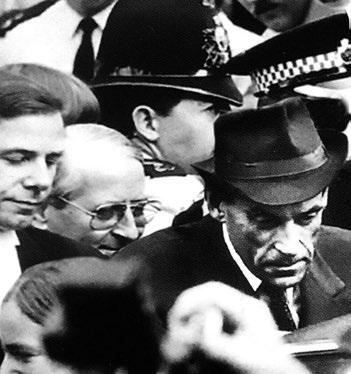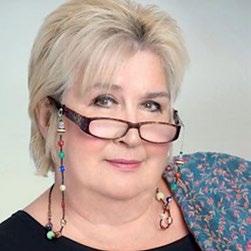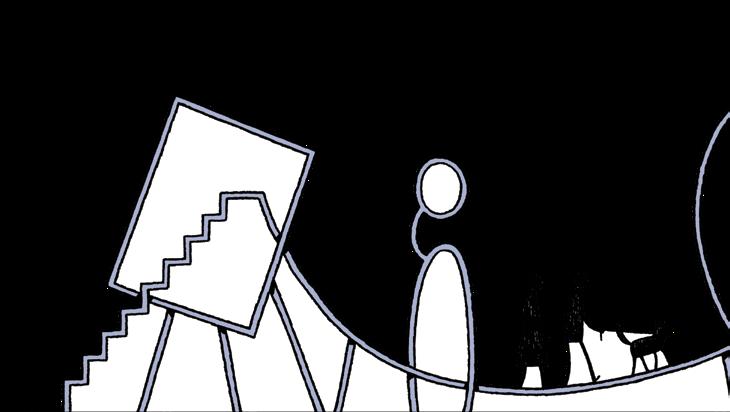
4 minute read
Too much drinking at the Bar
Drinking at the Bar
Graham Boal successfully defended Jeremy Thorpe with George Carman. But both top lawyers were alcoholics
Advertisement
In September 1993, I was admitted to the Priory Hospital in Roehampton, suffering from a serious episode of depression.
I was placed under the care of Dr Desmond Kelly, one of the most distinguished psychiatrists in the country. He asked me how I had been dealing with the depression myself and what I did to try to relax.
I answered, ‘When I get home and, if I can put off any work I have to do by planning to get up early the next morning to do it, I pour myself a glass of whisky.’
Dr Kelly elicited, by a form of crossexamination of which I would have been proud, that ‘a glass of whisky’ was something of an underestimate. He skilfully dragged the truth about my drinking out of me. He established, both to his satisfaction and to mine, that I was trying to self-medicate and was ‘treating’ my depression by dulling the pain with alcohol. He reminded me that alcohol, far from helping to alleviate depression, is itself a depressant drug.
Dr Kelly (now retired) was a worldrenowned expert in the relatively recently discovered condition known as dual diagnosis, or the concept of the alcoholic depressive. Before my feet touched the ground I was transferred to Galsworthy House, the addiction unit at the Priory.
What is alcoholism?
There are numerous definitions of alcoholism, but the one I would choose is this: alcoholism is a pattern of alcohol use that involves problems controlling your drinking, being preoccupied with alcohol, continuing to use alcohol even when it causes problems to you and those around you, having to drink more to get the same effect, or having withdrawal symptoms.
I would humbly suggest that anyone who reads that definition and finds that it, or even parts of it, rings a bell, he or she should perhaps take a close look in the mirror.
A much simpler question, but one that I find helpful, is ‘Does my intake of alcohol cause problems?’ Mine certainly had.
The condition certainly has something to do with compulsion and an inability to exercise self-control. As an illustration: if one sees a man – who has already had more than enough – unable to leave the table if half a bottle of wine remains without making sure it is empty before he gets up, then one must begin to wonder if he has a serious problem.
On my first morning at Galsworthy House, I attended my first session of group therapy. The man on my left was Oldie contributor Charlie Mortimer, who wrote the book Dear Lupin and has since spoken courageously of his experiences.
Charlie, who became a friend, was at that time addicted to a painkiller. As the counsellor went round the group, I heard answers including heroin, nicotine, shopping and gambling as well as my own response, ‘Alcohol.’
The man on my other side at first refused to share his problem. After considerable encouragement from the counsellor and the rest of us he eventually blurted out, ‘OK then, I can’t stop f**king other men’s wives!’
That broke the ice and we realised that we had a ‘full house’. We were all in the same boat, because the disease or condition is actually addiction: pure and simple.
I suspected my father may have had a problem with alcohol; I don’t know that for certain, and I have no way of investigating whether it was in the family. I do remember that, when I was no more than 14, he mixed some very powerful cocktails and that, after guests left, I would go round the glasses, lapping up the remnants. I was introduced to whisky by my mother in my teens, and certainly kept pace with my fellow students at university.
In retrospect I now see that, as soon as I went to the Bar, I was a very willing pupil of Roger Frisby, who died a sad, penniless and drinking alcoholic, not only in chambers but also in El Vino, the criminal Bar’s favourite watering hole.
My colleague George Carman – we represented Jeremy Thorpe together – was, in my opinion, certainly an alcoholic, and it is without doubt that alcoholism was, and I suspect still is, rife in my profession.
There were lighter moments, indeed much laughter, in those rooms. One of these occurred when Charlie Mortimer arrived late for a group meeting and, having apologised profusely, explained that he had been stuck on the phone in a futile attempt to get some sense out of his mother, who (quoting his racing journalist father, Roger Mortimer) ‘had clearly had her head in the Martini bucket all morning and was thus totally unplayable’.
When I left the Priory, I started to try to rebuild my life, a long and often painful process and one in which I am still engaged to this day, almost 28 years into my recovery. I hope to die a recovering alcoholic.
Graham Boal QC, George Carman QC and Jeremy Thorpe after Thorpe’s acquittal. The Old Bailey, 1979
Graham Boal’s A Drink at the Bar is out now (Quiller, £20)









